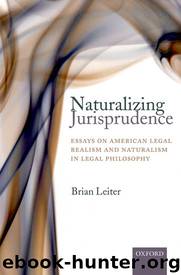Naturalizing Jurisprudence: Essays on American Legal Realism and Naturalism in Legal Philosophy by Brian Leiter

Author:Brian Leiter
Language: eng
Format: epub
Published: 2014-05-09T16:00:00+00:00
But how do we know that a particular use of language—e.g., saying “It is true that Patterson is liable for his negligence”—is a competent use of language? Patterson quotes Putnam saying that the measure of such competence is whether “a sufficiently well-placed speaker who used the words in that way would be fully warranted in counting the statement as true of that situation” (168). This answer, however, seems to be in tension with another one of Patterson’s central themes: namely that “the realism/antirealism debate is phony” (166).
Let me say a few quick words about the debate to which Patterson alludes. The “realist” holds that the meaning of a sentence is given by its “truth-conditions” (i.e. the facts that would have to obtain in the world for the sentence to be true), and that these truth-conditions can, in principle, transcend our best capacities to verify them. The anti-realist denies that “truth” (or “truth-conditions”) can transcend our epistemic capacities: “truth” for the anti-realist is “epistemically” constrained. In that sense, “truth” for the anti-realist is often said to be a matter of “warranted assertibility”: what is “true” is what we (given our epistemic capacities) would be warranted in asserting.
We can put this all more informally: the realist holds that the “truth” is whatever it is, regardless of whether we human beings now know it or could ever come to know it; the anti-realist holds that “truth” cannot outrun our capacity for verifying or knowing it. The anti-realist view suggests a type of “relativism or crass conventionalism” (169), in the sense that “truth” is relativized to our epistemic capacities or to our existing (or potential) conventions for establishing what the “truth” is.
Now we can articulate the tension between Patterson’s claim to have transcended the realism/anti-realism debate and his invocation of Putnam’s view that a “competent” use of language is one in which “a sufficiently well-placed speaker (p.142) who used the words in that way would be fully warranted in counting the statement as true of that situation.” The problem is that Putnam’s account of “competence” ties correct and incorrect usage to to what we “would be fully warranted in counting… as true,” i.e. it relativizes “competence” to epistemic capacities, and thus sounds like a classic anti-realist position! 12 So “postmodernism” on Patterson’s account turns out to be indistinguishable from anti-realism—a result that would not be surprising to some. 13
Patterson, however, follows Rorty (166-8) in arguing that by rejecting “representationalism”—the view that language and truth are matters of accurate representation rather than of social practice and approval—the realism/relativism debate has been rendered unintelligible. 14 The idea, roughly, is this: once we dispense with the idea of language as representing the way things are, then we no longer have to worry about whether our ways of talking about the world correspond to the (realist) truth (i.e. the way things really are, regardless of what we think) or whether they merely reflect some “relative” truth (i.e. the way we happen to be warranted in taking them to be).
Download
This site does not store any files on its server. We only index and link to content provided by other sites. Please contact the content providers to delete copyright contents if any and email us, we'll remove relevant links or contents immediately.
Future Crimes by Marc Goodman(3002)
American Kingpin by Nick Bilton(2970)
The Meaning of the Library by unknow(2068)
Inside the Middle East by Avi Melamed(1939)
On Tyranny by Timothy Snyder(1858)
Why Nations Fail: The Origins of Power, Prosperity, and Poverty by Daron Acemoglu & James Robinson(1787)
Living Silence in Burma by Christina Fink(1728)
Putin's Labyrinth(1656)
The Mastermind by Evan Ratliff(1591)
Think Like a Rocket Scientist by Ozan Varol(1396)
Law: A Very Short Introduction by Raymond Wacks(1383)
The Smartest Kids in the World by Amanda Ripley(1367)
Leadership by Doris Kearns Goodwin(1349)
The Rule of Law by Bingham Tom(1318)
A Dirty War by Anna Politkovskaya(1313)
It's Our Turn to Eat by Michela Wrong(1301)
Philosophy of law a very short introduction by Raymond Wacks(1297)
Social Media Law in a Nutshell by Ryan Garcia & Thaddeus A Hoffmeister(1249)
Civil Procedure (Aspen Casebooks) by Stephen C. Yeazell(1174)
